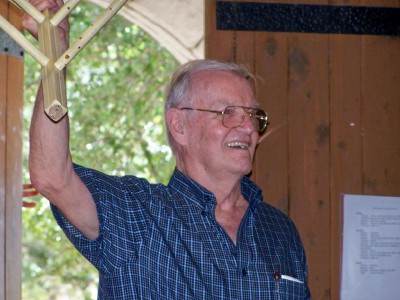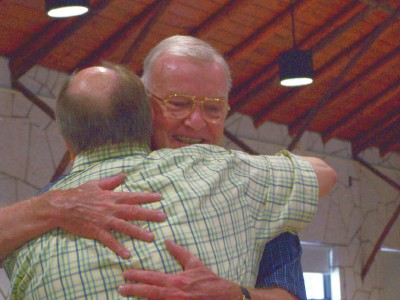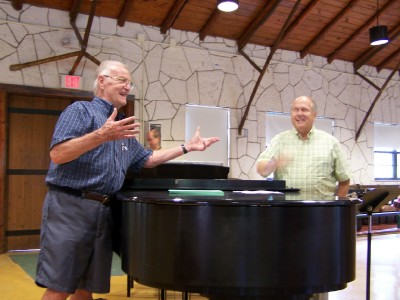<code
 Dr. Robert R. Ball
Dr. Robert R. Ball
WHAT DOES IT MEAN TO BE HUMAN?
Sermon first presented
January 25, 1970
Block 2
 |
Block 3
WHAT DOES IT MEAN TO BE HUMAN ?
Scripture: Genesis 1:26-31
Sermon by
Dr. Robert R. Ball
Memorial Drive Presbyterian Church
January 25, 1970
If someone invited you to go to a movie, you’d probably ask, “What’s playing?” You might
even want to know, “What’s it about? Who has the lead? Who’s the director?” We wouldn’t want
to commit to a whole evening, of which we have too few, without knowing it would be worth our
time.
Strange, isn’t it, that we show more interest in how we spend our evenings than in the way
we use our lives. It seldom occurs to us to as, “What is the drama of life all about? What is my
part in it? Who is the director?” And yet, every goal we pursue and every decision we make is
based on some assumption as to what life is about and what our part in it is.
To say that such questions are only for philosophers is the same as saying that we are willing
to stumble carelessly out onto the stage of life, to ad lib a few innocuous lines, and to take all our
cues from whatever other people happen to be doing around us. This kind of hit or miss living gets
to be more and more fatiguing when the whole scenery of life changes as rapidly and as completely
as it does today. This constantly shifting direction brings us to the end of the day having played
many different roles but none of them meaningful or satisfying. This is why so many people come
to the end of their lives and look back wondering sadly if it were even important for them to have
lived at all.
What is life all about? Who is its director? What is my place in it?
These are the questions which Genesis creation story seeks to answer, and the answers it
gives have never been more appropriate nor more authentic than they are today. All of findings of
modern depth psychology have been anticipated in this revelation made by God to the Hebrews
thousands of years ago. We see our own lives described in living color in the wisdom of this ancient
creation narrative. We need to pause and recheck our bearings. We need to ask where we are
going and why; to be humble enough and honest enough to hear what God’s word has to say
about what it means to be human.
I.
The first part of this creation story unfolds with an almost monotonous repetition: God said,
God created, God made. But suddenly, there’s a change; the whole symphony moves to another
key.
“Then God said, ‘Let us make man in our image, after our likeness;
and let them have dominion over the fish of the sea, and over the birds
of the air, and over cattle, and over every creeping thing that creeps upon
the earth.’ ”
Then it is as if the cymbals crash together and God’s cantata reaches its most incredible climax.
Having created a creature in his own image, GOD PROCEEDS TO SPEAK TO HIM! Try to grasp
the significance of this. God did not speak to any other part of his creation, only to man. This is
what distinguishes man from all the rest of creation. Man is capable of responding to God. To be
human, therefore, is to be response-able, to be responsible.
The first responsibility which man is given by God is to have dominion over all the rest of creation.
In other words, God holds us accountable for the proper use of the world he has entrusted to us.
How responsible have we been? We have allowed rich farm land to be sucked dry by man’s greedy
search for a fast buck while more than half of the world is suffering from malnutrition. We have
produced prodigious city slums that breed hopelessness and hate and crime, almost daring the
inhabitants to get out if they can. We have filled our skies and waters with refuse and pollution that
now threaten human survival. Our responsibility record is not good. It is time for us to be reminded
that as human beings we are created to be co-workers with God. It is appropriate, therefore, for
Christ’s Church to be concerned about population and pollution.
Perhaps the truth is more easily understood when one has been reared on the farm. There it is
obvious that if you carelessly plow your field contrary to the contours of the land, your field will run
away and leave you, ravaged by the wind and water. There is a “given” order to creation which
cannot be ignored. When we treat irresponsibly the riches God gives to us, we lose them.
To have dominion over the earth does not mean that we are free to manipulate it in any way that
we may please. It means that we are to act as the emissaries of God in developing all the purpose
and possibilities God creates within his world. For example, to try to build a segregated society is
as contrary to the nature of reality as is trying to plow up and down on the side of a hill. Life simply
isn’t made that way. Man is responsible to God for how he plays on the societies he builds in the
world. Accepting that responsibility is a major part of what it means to be human.
II.
A second aspect of what the creation story says it means to be human is that life is to be lived
in relationship with other humans. Men have long recognized that the most severe punishment
short of death that can be administered to any person is solitary confinement.
“So God created man in his own image, in the image of God
he created him; male and female he created them. And God
blessed them, and God said to them, “Be fruitful and multiply,
and fill the earth and subdue it.”
“Male and female he created them.” From here to the very end of the Bible this understanding
continues. God creates us, as Paul says in his Letter to the Romans, to be “members of one
another.” TO BE HUMAN IS TO LIVE IN RELATIONSHIP WITH OTHER HUMANS. Man is not
meant to live alone. Man is not intended to bear his burdens all by himself nor to contain his joys
all unto himself.
Somewhere in the days of the American frontier there developed the image of the “rugged
individualist”; in business he was known as the “self-made man.” There persists to our day the
myth that the really strong man is the man who lives unto himself, solving all his own problems
and building his own success.
The results of this distorted notion about man can be seen in our mental hospitals, in our
tormented homes, our resentful children, and our alienated society. We have produced the man
who cannot cry and who will not tolerate crying in others. We have produced the man who looks
scornfully on the needs of others because his image of himself will not permit him to admit to any
needs of his own. As a result, life becomes a matter of taking care of “number one,” and who is
“number one” in that contest cannot be solved by playing a bowl game. It is fought out in struggles
in homes and offices and schools and cities millions of times every day of the world. Life was not
created to be lived in lonely competition but in loving cooperation.
Recently, I talked to a man from another city who lost his wife last summer. He told me, “I
guess I miss her most when something good has happened. Before I know it, I’m saying to myself,
‘I can’t wait to go home and tell Francis about this.”
All the success in the world is meaningless if there is no one with whom to share it, and no
human misery is really bearable if there is no one who cares. When God put man together, he
never meant for him to live alone; we ought to give up trying it in our families, in our church, in
our world. A major part of what it means to be human is to live in vital, personal, sharing
relationships with other human beings.
III.
There is one more thing the creation story says more insistently than anything else about what
it means to be human: MAN IS CREATED IN THE IMAGE OF GOD.
This does not mean that we are made to look like God; nor does it mean that there is a little bit
of God in each of us. It means that we have been created with the capacity to reflect the life of God
so that his image is seen in us. When I stand in direct line with a mirror, my image is seen in that
mirror. When I stand in a proper relationship to God, his image is seen in me – his love, his power,
his truth is reflected in me. When I am not in a proper relation to God, his image is not seen in me
and I am not really a human being. Man is created to be a person in the image of God. When he is
not, he is less than a man.
A tree can be a tree without making a decision about it. A dog can be a dog without any choice
required. In fact, he has no other choice; he can only be a dog. It is not so for us. We can choose to
be less than human. We can deny that we have any responsibility to, or need for, God in our lives.
we can insist that all we need is our own intelligence and instincts. But such a life is less than
human. It is a life that differs only in degree from the life of an animal. Man is created to live in the
image of God. We have the choice of either accepting or rejecting our destiny.
From this biological point of view, man is only a mammal – no argument there; but who is really
willing for his life to be explained in purely biological terms? Are we willing to say that what a human
mother feels for her child is no different than the protection and care a monkey gives to her young?
Is the death of a human being of no more consequence to the world than the death of an animal?
Is human sexuality only a matter of satisfying an animal instinct planted within us as a means of
propagating our species? Human sexuality DOES have its biological side, but it is still something
more and something different. Human beings have a distinct capacity for relationships of love and
trust. Our sexuality is a special means for communicating the joy of that relationship.
No one is truly human automatically. This should be apparent. Our newspapers are full of
inhuman exploitation and neglect. To be human is to make a choice about who we are. Either we
choose to live in a committed relation to God so that his image is seen in us, or we lose our
distinct capacity and become less than human.
It is so easy to see and think of ourselves in other terms. Advertising encourages me to think
of myself as a consumer. My family responsibilities make me look like little more than a producer.
I have a yearning to be an experiencer, tasting all of life’s thrills, filling my life with luxuries. But
when we begin to see ourselves in terms such as these, life becomes shallow and pointless. The
aging star in her plush penthouse somehow knows, “This is not why I was created. To be human
has to be more than any of these.”
Our relationship with God is the pivotal point of our whole humanity. When a people’s regard
for God is lost, respect for human life is sure to follow. How and what I think of God determines
how and what I will think of myself and of others. That is what the late Karl Barth had in mind
when he wrote:
“Christian worship is the most momentous, the most urgent,
the most glorious action that can take place in human life.”
That’s why Jesus Christ is our Savior. In him we are restored to our proper human relationship
to God. In him we are permitted to know the unlimited depths of God’s love, acceptance, and
forgiveness. Knowing that, we are able to love, accept and forgive ourselves – and others as well.
Look on Jesus Christ and see the confidence of God flowing into you. In the midst of a world
that has so many different things to say about who we are, the option is ours to believe we are who
Christ says we are, to decide to be human.
To be human is to be responsible for the use we make of the world’s resources. To be human is
to live in personal relationships with other humans. To be human is to live by choice in a committed
relationship with God in Christ.
Block 4
 |
Block 5
Photos of Joyful Noise/Joyful Echo Reunion, August 6-9, 2010
Allen Pote and Robert R. Ball
The instigators.
Block 6
 |
>